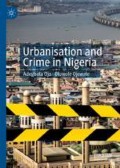Abstract
This chapter concludes the book by discussing some of the key findings of the study. The findings are discussed as they relate to insights that are relevant for practitioner and scholarly communities that are at the vanguard of addressing urban crime. The chapter continues by elucidating the main lessons and concludes with a raft of policy recommendations that can help make Nigerian cities more agile and responsive to the problem of urban crime.
Access this chapter
Tax calculation will be finalised at checkout
Purchases are for personal use only
References
Adele, B. J. (2009). Falsification of Population Census Data in a Heterogeneous Nigerian State: The Fourth Republic Example. African Journal of Political Science and International Relations, 3(8), 311–319.
Alemika, E. E. O. (1988). Policing and Perceptions of Police in Nigeria. Police Studies, 11(4), 161–176.
Alemika, E. E. O. (2012). Do the Nigerian Public Trust Their Police? Improving Institutions for Pro-Poor Growth Briefing Paper 21. Retrieved March 20, 2019, from http://www.iig.ox.ac.uk/output/briefingpapers/pdfs/iiG-briefingpaper-21-PublicTrustNigerianPolice.pdf.
Alemika, E. E. O., & Chukwuma, I. C. (2000). Police-Community Violence in Nigeria. Lagos and Abuja: CLEEN Foundation and the National Human Rights Commission.
Andresen, A. A., & Malleson, N. (2013). Crime Seasonality and Its Variations Across Space. Applied Geography, 43, 25–35.
Ani, K. J., & Nweke, E. N. (2014). Curbing Kidnapping in Nigeria: An Exploration of Strategic Peace Building Tools. Africa’s Public Service Delivery and Performance Review, 2(1), 111–133.
Bloch, R., Fox, S., Monroy, J., & Ojo, A. (2015). Urbanisation and Urban Expansion in Nigeria. Urbanisation Research Nigeria (URN) Research Report. London: ICF International.
Braga, A. A., Andresen, M. A., & Lawton, B. (2017). The Law of Crime Concentration at Places: Editors’ Introduction. Journal of Quantitative Criminology, 33(3), 421–426.
Chêne, M. (2010). Anti-corruption and Police Reform. Transparency International U4 Expert Answer, 24, 1–10. Retrieved March 25, 2019, from https://www.u4.no/publications/anti-corruption-and-police-reform.pdf.
Cozens, P. (2002). Sustainable Urban Development and Crime Prevention through Environmental Design for the British City. Towards an Effective Urban Environmentalism for the 21st Century. Cities, 19(2), 129–137.
Ezepue, P. O., & Ojo, A. (2012). Addressing Economic Development Goals through Innovative Teaching of University Statistics: A Case Study of Statistical Modelling in Nigeria. International Journal of Mathematical Education, 43(8), 1013–1032.
Farrell, K. (2018). An Inquiry into the Nature and Causes of Nigeria’s Rapid Urban Transition. Urban Forum, 29(3), 277–298.
Ferguson, B., Restrepo, J. A., & Villamarín, A. (2010). Estimating Potential Gains in Life Expectancy by Reducing Violent Deaths in Selected Countries. Retrieved August 15, 2018, from https://www.diw.de/documents/dokumentenarchiv/17/diw_01.c.346948.de/restrepo_conflict_gecc.pdf.
Kieghe, D. (2016). National Ambition: Reconstructing Nigeria. London: New Generation Publishing.
Rocca, C., Rathod, S., Falle, T., Pande, R. P., & Krishnan, S. (2009). Challenging Assumptions About Women’s Empowerment: Social and Economic Resources and Domestic Violence Among Young Married Women in Urban South India. International Journal of Epidemiology, 38(2), 577–585.
Sampson, R. J., & Groves, W. B. (1989). Community Structure and Crime: Testing Social-disorganisation Theory. American Journal of Sociology, 94(4), 774–802.
Shaw, C. R., & McKay, H. D. (1942). Juvenile Delinquency and Urban Areas. Chicago: University of Chicago Press.
Sherman, L. W. (2013). The Rise of Evidence-based Policing: Targeting, Testing, and Tracking. Crime Justice, 42(1), 377–451.
Author information
Authors and Affiliations
Corresponding author
Rights and permissions
Copyright information
© 2019 The Author(s)
About this chapter
Cite this chapter
Ojo, A., Ojewale, O. (2019). Conclusion. In: Urbanisation and Crime in Nigeria. Palgrave Macmillan, Cham. https://doi.org/10.1007/978-3-030-19765-0_10
Download citation
DOI: https://doi.org/10.1007/978-3-030-19765-0_10
Published:
Publisher Name: Palgrave Macmillan, Cham
Print ISBN: 978-3-030-19764-3
Online ISBN: 978-3-030-19765-0
eBook Packages: Law and CriminologyLaw and Criminology (R0)

